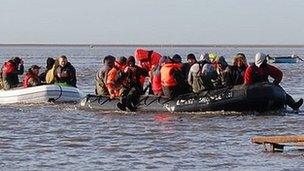Ribble estuary cockling plan drawn up by Fylde council
- Published

Fylde Council wants cockling to return in a "safe and orderly fashion" at Foulnaze Bank
A plan to police the Ribble estuary cockle beds has been put forward to the fishing authority.
Fylde council met the North West Inshore Fisheries and Conservation Authority (IFCA) on Monday to discuss cockling.
Proposals include reducing the number of permits and daily catch quotas.
The beds off the Lancashire coast were closed in November for safety concerns after 26 lifeboat rescues in what was described as a "gold rush" for cockles.
Up to 400 fishermen were cockling daily at Foulnaze Bank last year in the two months that the beds were open.
'Safe and orderly'
Other proposals put forward by Fylde Council include training on vessel safety for licensed fisherman and bringing the opening of the season forward to July rather than September when sea conditions are safer.
More stringent checks were also proposed to make sure the cockles being harvested are big enough.
Cabinet member for environment and partnerships at Fylde Council Tommy Threlfall said: "Extreme pressure was put on the cockling stocks - and also on the lifeboat crews - so that the long-term sustainability of cockle stocks was jeopardised.
"Having fewer cocklers, combined with better policing of their activities and of the size of cockles they take, will mean more regular opening of the fishery - rather than it having to close for decades at a time due to over-fishing.
"The aim is to see cockling return in a safe and orderly fashion."
The IFCA will decide on reopening the cockle beds following a survey of cockle stocks in February.
Dr Stephen Atkins, IFCA chief executive, said: "We will survey the beds on a good tide some time in the middle of February.
"We will see what the stock is like and how best to manage it."
Affected stock
He said the beds on Foulnaze Bank would not necessarily reopen.
"It might not be economical. The beds had been heavily fished before they were closed - four fifths of the stock had been fished.
"We have had gales recently so that could have resulted in further losses.
"However, the mild weather may have helped [cockles] grow. We will have to wait and see how stock has been affected," he added.
- Published9 November 2011
- Published1 November 2011
- Published29 October 2011
- Published27 October 2011
- Published11 November 2011